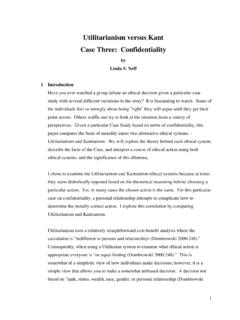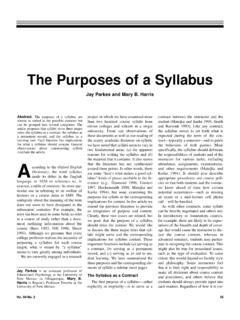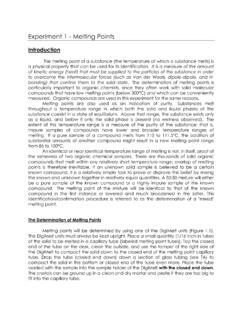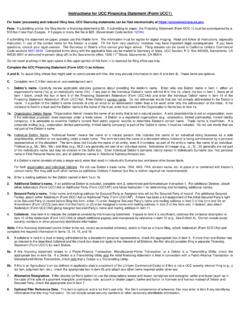Transcription of Using Indigenous Languages for Teaching and Learning in ...
1 Using Indigenous Languages forTeaching and Learning in ZimbabweJuliet ThondhlanaThe question of which language (s) to use for Teaching and Learning is acrucial one in bilingual and multilingual contexts. In former colonial countries,it is a question that has occupied the agendas of many governments since theyattained independence. Some countries have made strides towards addressing it( , Tanzania and Nigeria), although it continues to haunt others. As recentlyas 1997, African state representatives gathered in Harare, Zimbabwe for an inter-governmental conference on language policies in Africa hosted by UNESCO inorder to discuss the question of language planning and policy in Africa. Themeeting resulted in the Harare Declaration in which each country representeddeclared its commitment to the vision for Africa as expressed in the followingstatements: A democratic Africa that seeks to enhance the active participation of allcitizens in all institutions social, economic, political, et cetera; A democratic Africa where development is not construed in narroweconomic goals but instead in terms of a culturally valued way of livingtogether; and within a broader context of justice, fairness and equity forall; respect for linguistic rights as human rights, including those ofminorities; In broader terms, Africa that acknowledges its ethno-linguistic pluralismand accepts this as a normal way of life and as a rich resource fordevelopment and progress.
2 A democratic Africa that seeks to promote peaceful coexistence of peoplein a society where pluralism does not entail replacement of one languageor identity by another, but instead promotes complementary of functionsas well as co-operation and a sense of common destiny; Africa where democratisation in a pluralistic context seeks to producethrough sound and explicit language policies Africans who are able tooperate effectively at local levels as well as at regional and internationallevels; A democratic Africa that provides the environment for the promotionand preservation of an African identity as well as the cultivation of aproud and confident African personality; Africa where scientific and technological discourse is conducted in thenational Languages as part of our cognitive preparation for facing thechallenges of the next millennium. (Chimhundu et al., 1997)The representatives made a commitment to seriously take positive stepstowards implementing language planning and policy that, among other issues,takes into account the raising of the status and usage of Indigenous Languages .
3 Inthis paper, I raise arguments for the use of Indigenous Languages as Languages ofIndigenous Languages Across the Community32learning and Teaching , with special reference to Zimbabwe. The paper will givea brief description of the language situation in Zimbabwe. It will then addressthe question of why it is important to use Indigenous Languages as Languages oflearning and Teaching . It will also consider what steps Zimbabwe has takentowards stabilizing its Indigenous Languages before and after the HarareDeclaration. The paper will conclude by putting forward suggestions as to howZimbabwe can implement the use of Indigenous Languages in education. It ishoped that this discussion, although it will focus on Zimbabwe, will be relevantto other countries in Africa and elsewhere that are faced with similar : language SituationZimbabwe is a Southern African country. It has a population of about 13million made up of broadly African and European categories of population.
4 Thereare also smaller groups of people of Asian origin. Zimbabwe is, therefore, amultilingual/multicultural nation. There are three main national Languages inZimbabwe. These are Shona, Ndebele, and English. Of the three, English is thenational official language ; Shona and Ndebele are national Languages . In additionto the three main national Languages , there are fourteen minority indigenouslanguages as follows: Kalanga (predominantly spoken Zimbabwe but also spoken in Botswana) Nyanja/Chewa (predominantly spoken in Malawi) Tonga (predominantly spoken in Zambia; also spoken in Namibia,Botswana, and Mozambique) Nambya (Zimbabwean) Hwesa (Zimbabwean) Shangani (predominantly spoken in South Africa; also spoken inMozambique) Barwe (predominantly spoken in Mozambique) Sotho (predominantly spoken in Lesotho, also Africa) Venda (predominantly spoken in South Africa) Chikunda (predominantly spoken in Mozambique; also Zambia) Xhosa (predominantly spoken in South Africa) Sena (predominantly spoken in Mozambique) Tshwawo (Khoisan) (also spoken in Botswana, Namibia, and Zambia) Tswana (predominantly spoken in Botswana and South Africa)The minority groups constitute approximately 10% of the total Zimbabweanpopulation.
5 Six of these minority Languages , namely, Kalanga, Shangani, Chewa,Venda, Tonga, and Nambya are officially , like many African countries, tends to follow the policy of usingthe former colonial language (English in this case) as the official language ofmuch of parliament, trade and industry, the mass media, and education. AlthoughShona and Ndebele are now accepted for use in some formal domains, such as inUsing Indigenous Languages for Teaching and Learning in Zimbabwe33the senate and as a language of instruction in lower primary education, Englishcontinues to dominate as the national official language . In education, Englishcontinues to be the dominant language . The latest Education Act (1987, asamended in 1990) states that:1. The three main Languages of Zimbabwe, namely Shona, Ndebele andEnglish, shall be taught in all primary schools from the first grade asfollows a. Shona and English in all areas where the mother-tongue of themajority of the residents is Shona orb.
6 Ndebele and English in all areas where the mother tongue of themajority of the residents is Prior to the fourth grade, either of the Languages referred to in paragraph(a) or (b) of sub-section (1) may be used as the medium of instruction,depending upon which language is more commonly spoken and betterunderstood by the From the fourth grade, English shall be the medium of instructionprovided that Shona or Ndebele shall be taught as subjects on an equal-time allocation as the English In areas where minority Languages exist, the Minister may authorise theteaching of such Languages in primary schools in addition to thosespecified in sub-section (1), (2) and (3). (Part XI, Section 55, )As shown above, although all the major Languages enjoy some small degreeof prominence under the Act, English continues to enjoy the central role, asindicated in sub-section (3) and in the non-obligatory nature of the early primaryschool mother-tongue instruction. Further, this recognition is largely in wordonly.
7 In Zimbabwe, most schools prefer to use English from the outset to ensuretheir students proficiency in English, which is considered the language of powerand economic wellbeing. It should be noted that, when they start school, most ofthese children have very low or no proficiency in English. Teachers and parentsare concerned that, after the third grade, when they have to switch to English,the children s low level of proficiency in English would make Learning difficultand detract from whatever they would have learnt so far in the mother tongue. Inthe case of minority Languages , it has been noted that implementation of this Actis even more difficult because the few teachers who are proficient in the languagesare not deployed in the relevant areas. This is because deployment of teachersdoes not involve consideration of the question of lower primary medium fact that demonstrates the continued dominance of English is thefact that the minimum pass level in Zimbabwe is five O (Ordinary) levelsubjects, and one of these five subjects should be English.
8 Generally, without apass in O level English, one cannot be considered for further education andemployment. It should be noted that Shona, Ndebele, or any of the otherindigenous Languages are, currently, not acceptable substitutes. On the teachingIndigenous Languages Across the Community34of Shona as a subject, Chiwome and Thondhlana (1990) have noted that, even inthe Teaching of Shona subjects, some teachers prefer to use English as the mediumof instruction and some Shona students prefer to write their essays about Shonain English when they are given a choice. However, research has revealed somedegree of code switching between English and Indigenous Languages inclassrooms of grades and forms beyond grade three (Chitiga, 1994). Thesignificance of this practice is yet to be determined. There is also an addedproblem. In Zimbabwe, as well as elsewhere in Africa, bilingualism has tendedto be subtractive because the socio-cultural attributes of Indigenous languageshave been denigrated in favour of those of the colonial language , which isconsidered to be more prestigious.
9 This has even resulted in some Africans,educated through the medium of a colonial language , shunning their mothertongues (Sure & Webb, 2000). It is not surprising, therefore, that, in Zimbabwe,English continues to dominate the education system. There has been, in manycases, little or no conscious effort to promote students cognitive skills (memory,ability to generalize, ability to grasp relationships such as cause and effect, abilityto predict consequences, ability to grasp the essential message of a text); theiraffective skills (positive attitude to work, loyalty to one s country, tolerance fordiversity); and their social skills (ability to work together with, communicate,and support others) in their mother tongue. Consequently, there have been noefforts to promote the use of the mother tongue in technological and above situation has had some of the following serious consequencesfor educational development in Zimbabwe: Indigenous Languages have not been taken seriously as subjects of study.
10 Too much emphasis has been placed on proficiency in English, which,in many cases, is introduced to children from the first day of school. Proficiency in the mother tongue is, in some cases, jeopardized becauseteachers and parents focus on Learning English at school and home. It issaddening that, in some cases, children come to school proficient intheir mother-tongues but soon begin to lose this as the focus is shifted todeveloping proficiency in English both at school and what appears to be a negative picture regarding Zimbabwe sindigenous Languages , some steps have been taken towards stabilizing are the following: The launching of the ALLEX (African Languages and LiteratureLexicography) project at the University of Zimbabwe, which, amongother activities, is involved in the development of dictionaries and thecreation of literary and technical terminology in Indigenous far, the project has seen the publishing of the first monolingualdictionary in Shona, and another one is expected soon in the Indigenous Languages for Teaching and Learning in Zimbabwe35 The institutionalization of the ALLEX project as the ALRI (AfricanLanguages Research Institute) at the University of Zimbabwe.














